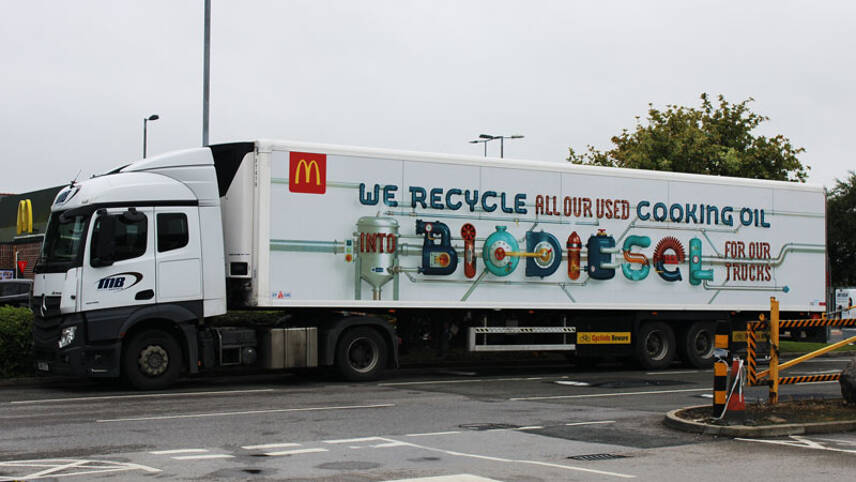Register for free and continue reading
Join our growing army of changemakers and get unlimited access to our premium content

Pictured: A McDonald's HGV in the UK using HVO as a fuel
More than 30 individuals have today (31 August) written to Transport Minister Jesse Norman calling for measures to bring the price of cleaner fuels, including hydrotreated vegetable oils (HVO) and other biofuels, in line with the price of diesel.
This coalition is recommending that the Department for Transport and Treasury work together to re-assess fuel duty schemes and explore tax incentives that would encourage fleet managers to transition away from diesel.
The letter argues that this can be done at no additional costs to the taxpayer, if costs associated with carbon emissions from diesel and the healthcare demands created by air pollution exposure are accounted for. Taxes could be increased on diesel to end the externalisation of these costs.
Transport is the largest contributor to the UK’s annual greenhouse gas emissions, generating 27% of the total. The majority of this is attributable to road transport, and the private sector owns and operates most vehicles on British roads.
“While some incentives do exist in the UK, these do not achieve price parity with diesel,” the letter states.
“The Republic of Ireland’s tax reclaim scheme directly reduces the cost of advanced biofuels to the same level as diesel across a range of functions including maritime, rail and micro-generation, and is a model worth examining carefully.”
The letter is spearheaded by fuel supplier Green Biofuels. Other signatories in this sector include Neste, World Fuel Serices and Bryce Oils.
Also supporting the call to action are representatives from NGOs such as Enjoy The Air and Common Seas, plus fleet operators like John Wainwright and JW Suckling Transport.
HVO and similar fuels are proving popular in the heavy goods vehicle (HGV) space as they are ‘drop-in’ replacements for diesel. Fleet operators do not need to retrofit HGVs or purchase new models to make the switch.
While using these kinds of fuels is not zero-carbon, decarbonisation benefits are stated to be significant. Green Biofuels states that its most advanced fuels can reduce life-cycle emissions by up to 90%.
“Electric vehicles are not the be-all and end-all of sustainable transport, and scrapping existing vehicles is not a green solution,” argued Green Biofuels’ director of sustainability Julian Keites.
HGV levy
Earlier this month, the UK Government reinstated the HGV levy following a temporary suspension due to Covid-19.
Zero-emission HGVs are now exempted from paying the HGV levy, provided they are emission-free at the tailpipe and would also be otherwise exempt from vehicle excise duty (VED). This exemption does not extend to hybrid vehicles.
The UK’s 2050 net-zero target is supported by a goal to end the operation of HGVs which are not zero-emission by 2040.


This has been an obvious early doors win available to government to help reduce transport emissions which are currently floundering that a mere 4% reduction versus 1990 levels. Either a rebate scheme or a fuel duty reduction could be applied purely to the haulage sector as their refuelling network is independent of traditional Forecourts and therefore should be easily implemented over alternative Net zero solutions wiles future alternatives for the Truck industry developed. Every kilogram of CO2 that is not released today is exponentially beneficial compared to waiting for some panacea solution.